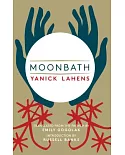Businessman Yuki Yajima is fifty-one years old. He and his wife, Asako, are the parents of two daughters: Ryo, seventeen, and Yuka, an infant of only two months. Asking himself why he's allowed
himself to become a father again at his age, Yuki begins to remember his uncle, who died quite young-younger, indeed, than Yuki is now. Thinking of this man, whom the young Yuki idolized, and
who first introduced the boy to authors like Kenzaburo Oe and the Marquis de Sade, serves as a strange tipping point: allowing a sense of chaos and complexity back into his otherwise
well-heeled life. A rare work of fiction focused simply on a man of integrity-a dying breed, in novels-The Shadow of a Blue Cat meticulously renders his life and opinions as Yuki tries
to find a middle path between the radicalism of his uncle's life and the quiet bourgeois home he's worked so hard to build.
From The Shadow of a Blue Cat:
"Perhaps I should start with a disclaimer. I am not some fresh-faced kid of seventeen or twenty, or even a relatively green thirty, which some people actually argue should be considered
below the age of majority these days. No, the fact is, I've already slid right on past the big five-oh-a milestone no one thinks is very pretty and few are eager to reach-to become a man of
fifty-one. Now if a reader were to say that it's unsettling to have someone who's passed the half-century mark presenting himself as the narrator of a novel styled after the young writers of a
generation ago, I would have to agree he has a point. But however much I may agree, I expect to press ahead in exactly such a style, for as I struggle to come to terms with my fifty-something
self, it has become all too uncomfortably clear to me that a style more suited to a man my age simply does not exist."





















